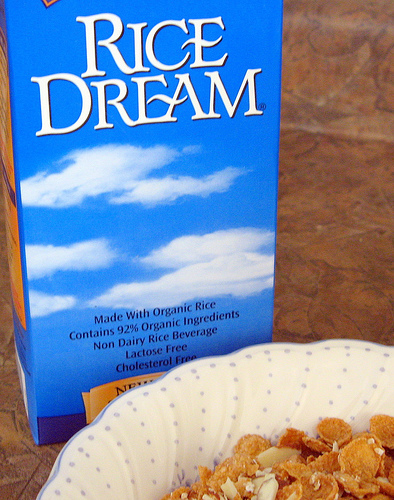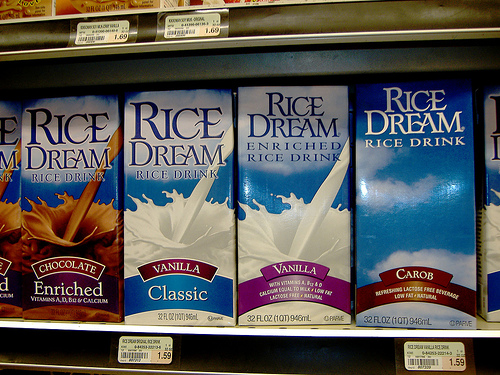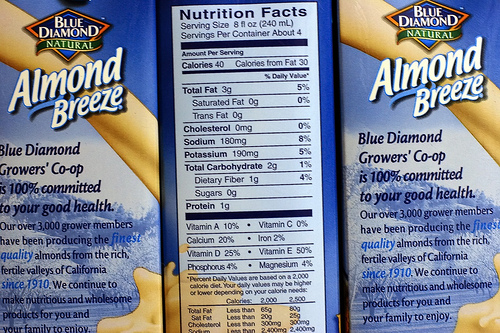All About: Milk alternatives
When trying to choose a milk alternative, there are two main factors to consider: why are you switching from milk, and what are you using it for?
There are several milk alternatives on the market, more every day, and they are becoming much more widely available. The extra choices are great, but they can make grocery shopping a bit confusing.
Why not milk?
There are three main reasons why people decide to switch from milk:
1. Intolerance issues
Whether you are intolerant to lactose (a form of sugar found in cow's milk) or casein (a protein found in cow's milk), many people have difficulty digesting cow's milk. This problem is more significant in some populations than others. I have read that up to 90% of Asians have trouble digesting cow's milk.
Note: You may want to try goat's milk. Some stores carry it fresh in the dairy case. It can also be found canned in the baking aisle near the condensed milk, but please note that the canned stuff is not very pleasant to drink.

Image courtesy Flickr/TriathleteFood
2. Hormones and other health issues
Some people worry about the hormones, antibiotics, and other chemicals found in milk because we dose our cows. Others may be concerned about the presence of GMO grains in the cows' diets, the type of cholesterol found in milk, and milk's potential inflammatory effects.
Note: Organic milk addresses many of these issues.
3. Humane considerations
You don't have to be a full-on vegan to feel uncomfortable about the way cows are treated in the dairy industry. Just like people, cows only produce milk (i.e. lactate) after having a baby. Thus, the dairy industry is run on cows which are impregnated over and over again, and their calves either butchered or raised up to become the next generation of dairy cow.
Note: if this is why you are avoiding milk, see if you can find a small local dairy in your area which has been Certified Humane. There are a lot of family-owned dairy farms out there who treat their cows well, and their milk tastes so much better than the mass-market industrial milk we're all used to.

Image courtesy Flickr/Andrea_44
Soy Milk
This is the biggest milk alternative in America today. Most stores carry several different kinds of soy milk, including flavored, unsweetened, and organic varieties.
Soy milk is not tolerated by everyone, and can cause digestive upset in some people. Soy milk also has a lot of troublesome issues with GMO grains, and is a highly processed food. I discussed many of these issues recently.
Almond Milk
Almond milk is rising in popularity, thanks partly to the almond's sterling reputation. This crop is free of a lot of the pesticides which are used on other crops, and almonds are very healthy for you.
You can also make almond milk at home, although I confess that I have never tried it, and it seems like an excessive amount of work to me. But for those for whom minimal food processing is important, making your own is a great way to go.
Unflavored almond milk has a slight nutty taste, not as strong as the taste of soy milk.

Image courtesy Flickr/dogwelder
Rice Milk
This is my personal least favorite milk alternative. I find it to be too watery for my liking.
However, rice milk has the benefit of being practically hypoallergenic, and suitable for people with dairy, soy, and nut allergies. Rice milk also has the least amount of fat compared to the other drinks on this list.
On the down side, rice - being a starch - makes a beverage which is very high in carbs (i.e. sugar). Rice milk has three or four times as many carbs, ounce for ounce, as the other alternatives. One glass of rice milk is roughly equivalent to the sugar in an average size Snickers bar.
Coconut Milk
This is the new up-and-comer on the scene. The canned kind of coconut milk (which is used in cooking) is often very high in fat. Coconut milk in cartons for drinking is much lower in fat, and has a more milk-like texture. (Canned coconut milk is usually much thicker than cow's milk.)
Coconut milk also has the advantage of being virtually pesticide free and non-GMO, thanks to the sturdiness of the coconut plant. It has a light coconut taste, which is good in some situations, but not so good in others.
Main image courtesy Flickr/DeathByBokeh
